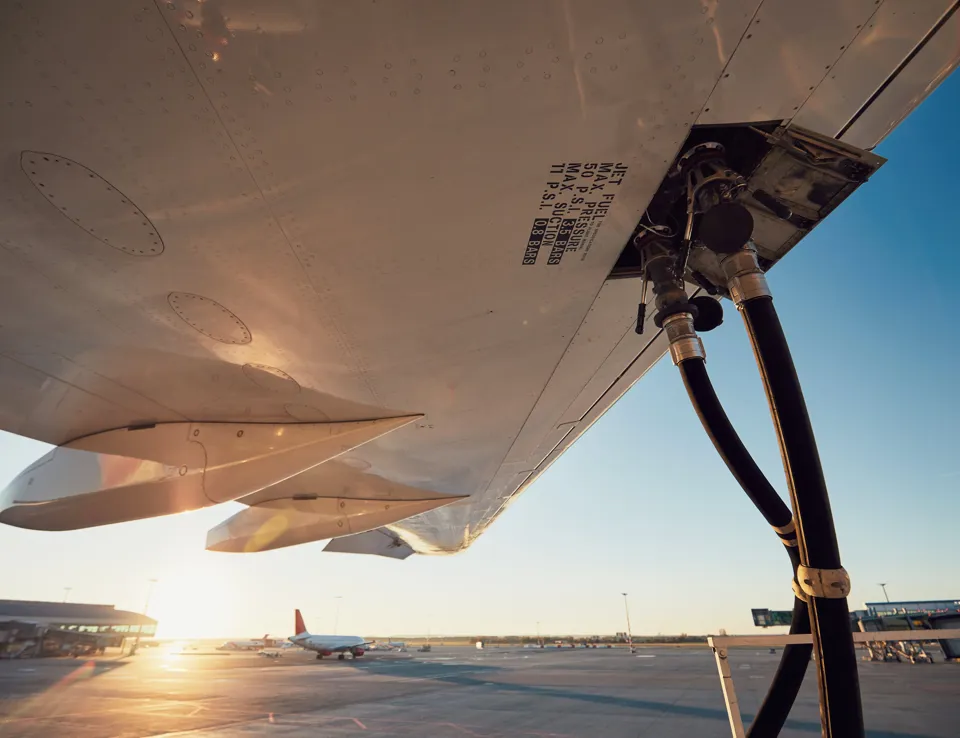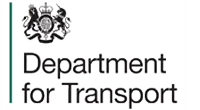Advanced Fuels Fund

About the fund
The UK Government’s October 2021 Net Zero Strategy laid out a commitment to:
“Become a leader in zero-emission flight, kick-starting commercialisation of UK sustainable aviation fuels (SAF) … to enable the delivery of 10% SAF by 2030”
To support this aim, the Advanced Fuels Fund was launched on 19 July 2022 by the Department for Transport (DfT). The second application window opened on 30 March 2023 and a new third application window opened on 07 February 2025. The Advanced Fuels Fund has competitively allocated £135 million in grant funding to support UK advanced fuels projects until 31 March 2025 and aims to competitively allocate an additional £63 million in grant funding to support UK advanced fuel projects until 31 March 2026.
Delivered by



About the AFF
The key objectives of the Advanced Fuels Fund are to:
- Kickstart the UK advanced fuels sector with the commercial deployment of innovative fuel production technologies that are capable of significantly reducing near-term UK aviation emissions.
- Broaden and strengthen the UK project pipeline, getting as many UK projects as possible to an "investment ready" state.
- Support the advancement of a diverse range of technology routes to SAF and other advanced fuels.
 The Advanced Fuels Fund will provide grant funding to first-of-a-kind (FOAK) commercial and demonstration-scale projects in the UK at all development stages up to construction starting, including “Feasibility”, “Pre-front-end engineering and design” (Pre-FEED)”, “Front-end engineering and design” (FEED) and up to 50% of eligible project costs during the “Detailed Design” and “Procurement of Main Equipment” stages within “Engineering, Procurement & Construction” (EPC). Grant funding has been allocated across five successful projects from the first application window and across nine successful projects from the second application window. DfT is committed to allocating up to an additional £63 million to successful applicants under the third application window. A sub pot of 50% of the third window funds will also be available specifically to support projects that use CO2 (point source or direct air capture) as their main carbon source in fuel production.
The Advanced Fuels Fund will provide grant funding to first-of-a-kind (FOAK) commercial and demonstration-scale projects in the UK at all development stages up to construction starting, including “Feasibility”, “Pre-front-end engineering and design” (Pre-FEED)”, “Front-end engineering and design” (FEED) and up to 50% of eligible project costs during the “Detailed Design” and “Procurement of Main Equipment” stages within “Engineering, Procurement & Construction” (EPC). Grant funding has been allocated across five successful projects from the first application window and across nine successful projects from the second application window. DfT is committed to allocating up to an additional £63 million to successful applicants under the third application window. A sub pot of 50% of the third window funds will also be available specifically to support projects that use CO2 (point source or direct air capture) as their main carbon source in fuel production.
Applications are now closed. Receipt of all applications has been acknowledged by email. It is not possible to accept late applicants.
A webinar launch event was held on 6 March 2025. The event gave an overview of the competition covering:
• The main assessment criteria and minimum requirements.
• Key dates and deadlines.
• The application form and appendices.
Applicants had the opportunity to ask questions during this session and these plus responses are recorded in the FAQ document in the Questions section of this webpage. The presentation and recording from the launch event are shared below.
All application windows are now closed.
Table 1 outlines the key dates and stages of the Advanced Fuels Fund, from initial launch to the end of the competition’s Funding Period. These are planned but may be subject to change.
Table 1. Key Dates
| Date | Stage |
|---|---|
| 19 July 2022 | Window 1 open for applications |
| 16:00 BST 14 September 2022 | Window 1 application deadline |
| 22 December 2022 | Announcement of winners and start of Funding Period for Window 1 projects |
| 30 March 2023 | Window 2 open for applications |
| 16:00 BST 7 June 2023 | Window 2 Application deadline |
| 17 November 2023 | Announcement of winners and start of Funding Period for Window 2 projects |
| 07 February 2025 | Window 3 open for applications |
| 16:00 (GMT) 28 March 2025 | Window 3 application deadline |
| 31 March 2025 | End of Funding Period for Window 1 and Window 2 winning projects |
| July 2025 | Announcement of winners and start of Funding Period for Window 3 projects |
| 31 March 2026 | End of Funding Period for Window 3 winning projects |
Applicants must meet the eligibility criteria outlined in the guidance document in order to be eligible for funding. If you are unsure if you meet the criteria, please contact AFF@ricardo.com.
The Advanced Fuels Fund’s third application window will be is administered and managed on behalf of the DfT by their delivery partners Ricardo and ERM. DfT are yet to appoint a delivery partner for the application assessment and awardee monitoring phases. DfT retains overall responsibility for the execution, eligibility and award decisions, contract terms and payments throughout.
A fair and competitive assessment process will be assured, including a rigorous process to manage any direct or perceived conflict of interest that may arise from a personal/working relation between an applicant and one of the delivery partners.
Please download the competition documents using the links below.
To ensure you are informed of all the latest news and updates in relation to the competition, please register for our mailing list by contacting AFF@ricardo.com.
Changes to competition documents are listed below.
| Document updated | Date |
| Guidance document v1.4 | 06/03/2025 |
| Application form: Appendix H (Demo) v1.1 | 06/03/2025 |
| Application form: Appendix H (FOAK) v1.1 | 06/03/2025 |
| AFF Application Form Appendix E (Plant costs) v2.1 | 21/03/2025 |
| AFF Guidance v1.5 - Window 3 | 21/03/2025 |
Please email AFF@ricardo.com if you have any questions. Questions and responses received during the third application window can be found in the FAQ document below.
Current list of Frequently Asked Questions
Please note that negotiation of the grant terms & conditions will not be possible. However, should you identify any element that prevents you from applying, please inform us at AFF@ricardo.com.
Window 1 materials:
- Advanced Fuels Fund Launch Event presentation
- Advanced Fuels Fund Launch Event recording
- Advanced Fuels Fund Launch Q&As
- Advanced Fuels Fund Lifecycle GHG Emissions Briefing Pack
- Advanced Fuels Fund Stakeholder Enquiries
- Advanced Fuels Fund Guidance document (.pdf)
- Advanced Fuels Fund Application form (.docx)
- Appendix D - A detailed project budget for the grant funded activities
- Appendix E - A projected cash-flow model template for the future commercial plant (.xlsx)
- Appendix H - A lifecycle GHG emissions template for your project’s main fuel output (.xlsx)
- Appendix G - An outline risk assessment (.xlsx)
- Advanced Fuels Fund Example Grant Agreement (.pdf)
Window 2 materials:
- Advanced Fuels Fund Launch Event presentation
- Advanced Fuels Fund Launch Event recording
- Advanced Fuels Fund FAQs
- Advanced Fuels Fund Guidance document v3.1 – Window 2
- Advanced Fuels Fund Application form v2.0 – Window 2
- Appendix D v1.0 – Window 2 - A detailed project budget for the grant funded activities
- Appendix E v1.0 – Window 2 - A projected cash-flow model template for the future commercial plant
- Appendix H v1.0 – Window 2 - A lifecycle GHG emissions template for your project’s main fuel output
- Appendix G v1.0 – Window 2 - An outline risk assessment
- Advanced Fuels Fund Example Grant Agreement

Window 1 Winning organisations
Based in the Industrial Cluster at Teesside, the project is developing a commercial scale plant that uses gasification and Fischer-Tropsch technology to convert black bin bag waste into sustainable aviation fuel (SAF). The plant is expected to be operational in 2028 and produce 86.6 kt/y of SAF when at full operational capacity.
Award: £11,001,000
Based in Port Talbot, South Wales, the project is developing a commercial scale plant that converts steel mill off-gases into ethanol and then uses alcohol-to-jet technology to produce sustainable aviation fuel (SAF). The plant is expected to be operational in 2026 and produce 79kt/y of SAF when at full operational capacity.
Award: £24,960,843
This project is developing a large demonstration plant that uses power-to-liquid technology to convert carbon dioxide from a fossil gas-powered electricity plant and hydrogen made from renewable electricity into sustainable aviation fuel (SAF).
Award: £2,523,094
Based in Ellesmere Port, Cheshire, the project is developing a commercial scale plant that uses gasification and Fischer-Tropsch technology to convert black bin bag waste into sustainable aviation fuel (SAF). The plant is expected to be operational in 2027 and produce 83.7kt/y of SAF when at full operational capacity.
Award: £16,764,000
Based in Immingham, Lincolnshire, the project is developing a commercial scale plant that uses gasification and Fischer-Tropsch technology to convert black bin bag waste into sustainable aviation fuel (SAF). The plant is expected to be operational in 2028 and produce 37.4kt/y of SAF when at full operational capacity.
Award: £27,000,000
Window 2 Winning organisations
Based in Teesside, the project is developing a demonstration plant that uses pyrolysis and hydrotreatment technology to convert sawmill and forestry residues into sustainable aviation fuel (SAF). The plant is expected to be operational in 2026 and produce 2.6kt/y of SAF when at full operational capacity.
Award: £4,484,000
Based in Teesside, the project is developing a commercial scale plant that uses power-to-liquid technology to convert biogenic CO2 and green hydrogen into SAF. The plant is expected to be operational in 2028 and produce 67.7kt/y of SAF when at full operational capacity.
Award: £12,341,000
Based in the Solent, the project is conducting a feasibility study into a commercial scale plant that uses gasification and methanol-to-jet technology to convert non-recyclable waste into sustainable aviation fuel (SAF). The plant is expected to be operational in 2030 and produce 179kt/y of SAF when at full operational capacity.
Award: £6,065,000
Based in Sheffield’s Translational Energy Research Centre, the project is developing a demonstration plant that uses power-to-liquid technology to convert biogenic CO2 and green hydrogen into sustainable aviation fuel (SAF). The project also includes the design of a commercial scale plant, expected to be operational in 2026 and produce 7.4kt/y of SAF when at full operational capacity.
Award: £2,814,000
This project is developing both a demonstration production module operating in Orkney and a commercial scale plant that uses power-to-liquid technology to convert biogenic and direct air capture CO2 and green hydrogen into sustainable aviation fuel (SAF). The commercial scale plant is expected to be operational in 2026 and produce 6.1kt/y of SAF when at full operational capacity.
Award: £3,492,100
- Based in the Industrial Cluster at Teesside, the project is developing a commercial scale plant that uses gasification and Fischer-Tropsch technology to convert biogenic and non-biogenic wastes and residues into sustainable aviation fuel (SAF). The plant is expected to be under construction in 2025, operational in 2028, and produce 124.2kt/y of SAF when at full operational capacity.
- This plant was supported in earlier development stages by the Green Fuels, Green Skies competition that made £15m available over the 2021/22 financial year.
- Alfanar was also supported in the first window of the Advanced Fuels Fund, as above. Their second window award is focused on the third funding year for activity that is not covered by their first window award.
Award: £8,664,000
This project is developing a demonstration plant that uses power-to-liquid technology to convert direct air capture CO2 and green hydrogen into sustainable aviation fuel (SAF). The plant is expected to be operational in 2027 and scale up to 12kt/y of SAF when at full operational capacity.
Award: £1,376,000
Based in Wilton at Teesside, the project is developing a commercial scale plant that uses pyrolysis and ethanol-to-jet technology to convert agricultural and wood waste into sustainable aviation fuel (SAF). The plant is expected to be operational in 2025 and produce 2.7kt/y of SAF when at full operational capacity.
Award: £9,063,015
Based in Teesside, the project is developing a commercial scale plant that uses power-to-liquid technology to convert carbon dioxide and green hydrogen into sustainable aviation fuel (SAF). The plant is expected to be operational in 2026 and produce 14kt/y of SAF when at full operational capacity.
Award: £4,721,000
Window 3 Winning organisations
Based in Stockton-on-Tees, the project is developing a commercial scale plant that uses torrefaction with gasification and Fischer-Tropsch synthesis technology to convert sawmill and forestry residues into SAF.
Award: £8 million (provisional)
Based in Wissington, the project is developing a commercial scale plant that uses ethanol-to-jet technology to convert sugar beet betaine residue bioethanol into SAF.
Award: £2.6 million (provisional)
Based in Hull, the project is developing a demonstration plant that uses solid oxide electrolysis, reverse water-gas shift and Fischer-Tropsch synthesis technology to convert direct air capture CO2, local heat sources and nuclear electricity into SAF.
Award: £1 million (provisional)
Based in Stanlow, the project is developing a large commercial plant that uses methanol-to-jet technology to convert renewable e-methanol and biomethanol into SAF.
Award: £2.5 million (provisional)
Based in Wilton, the project is developing a commercial scale plant that uses ethanol-to-jet technology to convert advanced bioethanol into SAF.
Award: £10 million (provisional)
Based in Stanlow, the project is developing a commercial scale plant that uses gasification and Fischer-Tropsch technology to convert refuse derived fuel into SAF.
Award: £2 million (provisional)
Based in the Humber Port, the project is developing a large commercial plant that uses methanol-to-jet technology to convert renewable e-methanol and biomethanol into SAF.
Award: £1.5 million (provisional)
This project is developing a demonstration plant that uses biogas-fuelled molten carbonate fuel cell technology for industrial biogenic CO2 capture, combined with renewable electrolysis, reverse water-gas shift and Fischer-Tropsch synthesis technology to produce SAF.
Award: £1.5 million (provisional)
Based in Saltend, the project is developing a small commercial plant that uses reverse water-gas shift and novel Fischer-Tropsch synthesis technology to convert biogenic CO2 and green hydrogen into high blend SAF.
Award: £3.5 million (provisional)
Based in Immingham, the project is developing a commercial scale plant that uses gasification and Fischer-Tropsch synthesis technology to convert municipal solid waste into SAF.
Award: £3 million (provisional)
Based in Workington, the project is developing a commercial scale plant that uses solid oxide electrolysis and Fischer-Tropsch synthesis technology to convert low carbon electricity and CO2 from direct air capture and biogenic sources into SAF.
Award: £6 million (provisional)
Based in the Humber region, the project is developing a commercial plant that uses methanol-to-jet technology to convert biomethanol and renewable e-methanol into SAF.
Award: £3 million (provisional)
Based in Redcar, the project is developing a commercial scale plant that uses methanol synthesis and methanol-to-jet technology to convert biogenic CO2 and green hydrogen into SAF.
Award: £5 million (provisional)
This project is developing two commercial scale plants, both which use ethanol-to-jet technology. One will convert recycled carbon fuel ethanol into SAF at Port Talbot. Another industrial site will turn use partial reverse water-gas shift and fermentation to turn waste CO2 sources and green hydrogen into ethanol for subsequent conversion into Power-to-Liquid SAF.
Award: £6.4 million (provisional)
Based at Oxford Airport, the project is deploying a small demonstration plant that uses combined catalysis technology to convert biogenic CO2 and green hydrogen into SAF.
Award: £3.1 million (provisional)
Based in the Midlands, the project is developing an end-to-end demo plant using advanced gasification, Fischer-Tropsch synthesis and gas reforming technology to convert waste to SAF.
Award: £4.2 million (provisional)
Based in Teesside, the project is developing a small commercial scale plant that uses autothermal reforming and Fischer-Tropsch synthesis technology to convert residue-derived biomethane into SAF.
Award: £2.9 million (provisional)
Background
- parts of engineering, procurement and construction (EPC)
- front-end engineering and design (FEED)
- pre-front-end engineering and design (Pre-FEED)
- feasibility study






